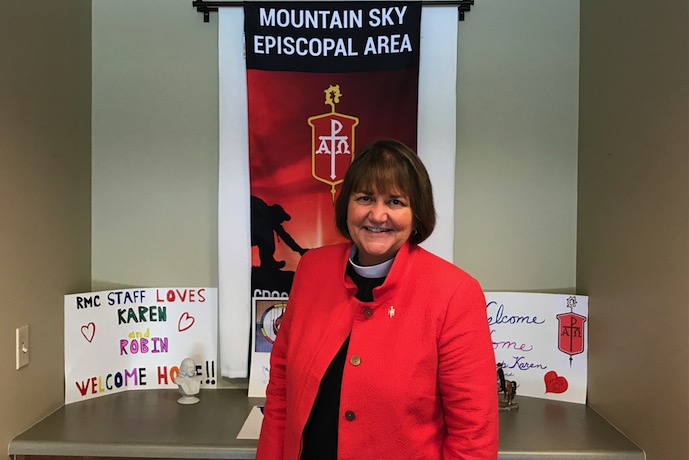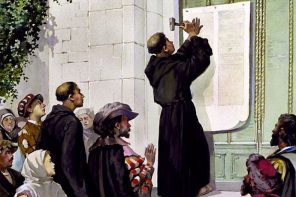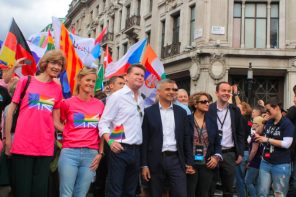The first out lesbian bishop consecrated by the United Methodist Church has long known that her path would lead to ministry. Bishop Karen Oliveto first felt the call when she was just 11 years old, preached her first sermon at 16, and became a student pastor at 18.
She came out as lesbian in seminary, where she was disappointed to learn that her authenticity around the way she believed God had created her suddenly made her “suspect.”
And even though a church judicial council ruled earlier this month that Oliveto’s consecration violated church law and requires a ministerial review, she remains in good standing with the church and, more importantly, she is more committed than ever to bringing peace, clarity, and acceptance to the United Methodist Church’s decades-long struggle over how to treat LGBTQ congregants and clergy.
Before her consecration as bishop, Oliveto “broke the stained glass ceiling” at the 12,000-member Glide Methodist Church in San Francisco, becoming the first woman to serve as a senior pastor at any of the denomination’s 100 largest congregations in the U.S. It was there that she experienced first-hand the expectation that she would bring her whole self to lead worship.
“I have been blessed to be out because my congregations expected it of me,” she explained. “And here’s what I’ve found: Whenever any of us lives an authentic life, an undefended life, it invites authenticity in others. It invites a disarming of one another.”
That experience was powerful and transformative, she said. She still proudly displays a plaque naming her a “Hero of the Tenderloin” in her district office just south of Denver, Colorado, where she and I sat down to discuss the future of LGBTQ equality in the United Methodist Church on Friday. (Watch the full interview in the Facebook Live video below.)
Although she had encountered broadly welcoming UMC communities throughout her career, Oliveto was admittedly nervous when she began to hear the call to episcopacy. “I didn’t want to be harmed,” she said. “I didn’t want my relationship [harmed], and I didn’t want to harm the church. I love this church. It is what has helped me know God.”
The morning after Oliveto and her wife decided that her name should move forward for the episcopacy in June 2016, they awoke to news of the massacre at Orlando’s Pulse nightclub, where 49 mostly LGBTQ Latinx people were murdered. That “confirmed the need” for Oliveto’s voice in the upper eschelons of church leadership, she explained.
“Too often, LGBTQ people and queer folk are talked about, instead of talked with,” Oliveto said. “And lives are turned into issues. And when we turn anyone into an issue, it makes it easier to do harm. [The shooting] just confirmed that it’s time for an LGBTQ voice to sit at the table.”
But even with Oliveto’s voice at the table, passionately advocating for her inclusive vision, she acknowledges that the institutional church has deep divisions over LGBTQ people.
“We talk about, all people should have their civil rights protected, including LGBTQ people,” she explained. “And yet, we don’t allow LGBTQ people to have rites in the church. We’re not allowed to marry, we’re not allowed to be pastors. We recognize that suicide among LGBTQ people, especially children, is high, and yet we don’t value the families of LGBTQ people. So it is this push-and-pull tension, that I think does create a muddling—a theological mess.”
Despite that mess, though, the bishop insists that there is no other church that she could go to. She hopes the countless LGBTQ people who write to her each month feel the same way. She points to the church’s Wesleyan spirituality and the particular way United Methodists “do theology” as among the key reasons she is called to ministry in this particular denomination. She posed a question for other LGBTQ people who may be questioning their place in UMC congregations or any faith community:
I think each of us has to say, where is God calling us to be? What enables our soul to sing? Because even as challenging as it is, my soul still sings. And there is joy in this life, and in my life in the church. And each of us has to find that spot—because that gets us through what’s challenging. That gets us through what seeks to oppress and deny us.
It’s easier to get through those challenging moments when one is located in the UMC’s Western jurisdiction, formally called the Mountain Sky Episcopal Area, the bishop acknowledges. More than any other UMC region, the western jurisdiction celebrates the diversity that sets it apart from more conservative regions. Because of its geographical position, the region over which Oliveto now presides is diverse of language, race, nationality, age, culture, sexual orientation, and gender identity.
“We’ve been able to see the face of God more fully because of that [diversity],” Oliveto said, beaming. “So we have something to teach the rest of the church that may not have as much diversity. We are a sanctuary for many people who can’t live back at home.”
Knowing and living that diversity has provided Oliveto with a front-row seat to the shifting demographics of the UMC and organized religion in general. But because she has found such welcome and affirmation in the communities she serves, Oliveto is not panicked about the church’s future, but rather hopeful for its continued march toward greater inclusion.
“If we look at the future of the church, and we look at the generations coming up; the generations coming up will not tolerate a closet,” she explained, a hint of excitement in her voice. “[This generation] will not tolerate people being pushed to the margins, because they have encountered a God who says, ‘come to me, all of you—there is room for everybody.’ And they’ve seen the value of each person.”
Juxtaposed with the current political environment, where violent exclusion and hateful accusations of neighbors being a dangerous “other” are encouraged from the highest political offices, Oliveto suggests that the new generations may ultimately be the UMC’s saving grace. In fact, it may be the only way to avoid a formal schism over these long-lingering questions about LGBTQ inclusion.
“If we take seriously the wholeness of the body of Christ, we’re going to start seeing people that we have never seen before,” Oliveto explained. “We’re at a moment in time where we can follow the leading of the spirit. … The Holy Spirit always enlarges our vision. It never narrows it. It never says some people are in and some people are out. It always says, ‘No, in fact the circle needs to be wider.'”
The alternative begets a dark future, the bishop warns:
“If the church of Jesus Christ, the body of Christ, can’t show that difference is not a bad thing, and it’s a sign of God’s divinity, if we can’t show what it’s like to live in the tension of those differences, and find unity, what hope is there for the rest of the world?”
Nevertheless, Oliveto is optimistic about the future of the church that still makes her soul sing. “I really believe there’s a love revolution going on,” she said of the response to her election. Even those who readily admit they are not activists have sought out her pastoral advice as they think through the challenges of a commandment to love one’s neighbor as oneself.
“This love thing is really demanding of us,” the bishop says numerous Methodists have told her. “And we’re going to have to risk being comfortable.” That’s a good sign, said Oliveto. “Because if I’m comfortable in my walk with Jesus, I’m probably not following really closely.”





